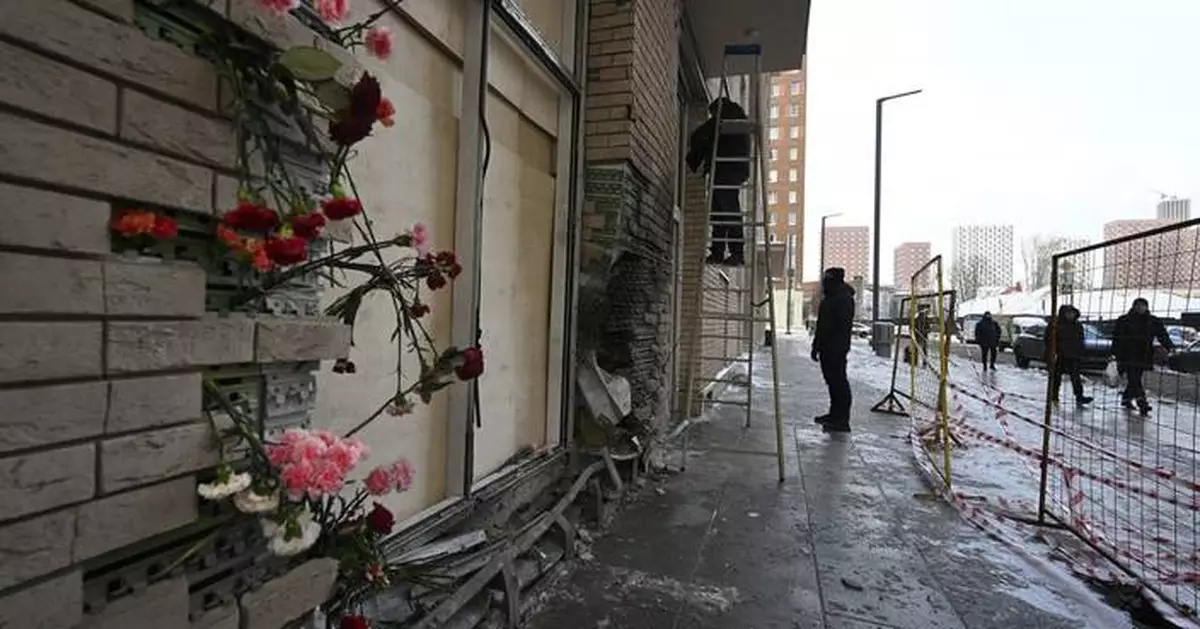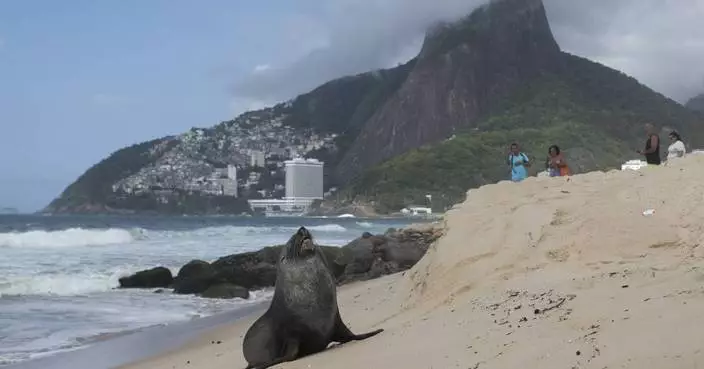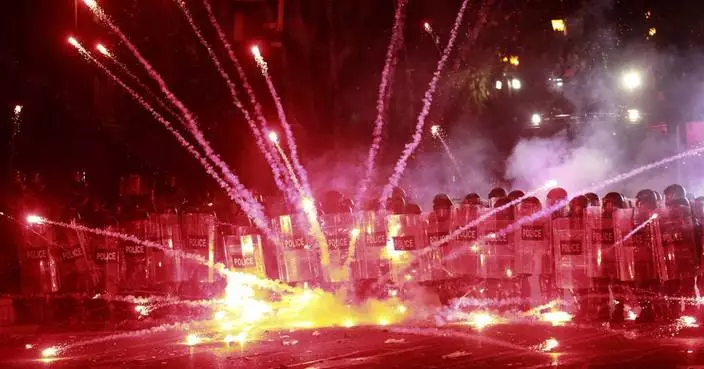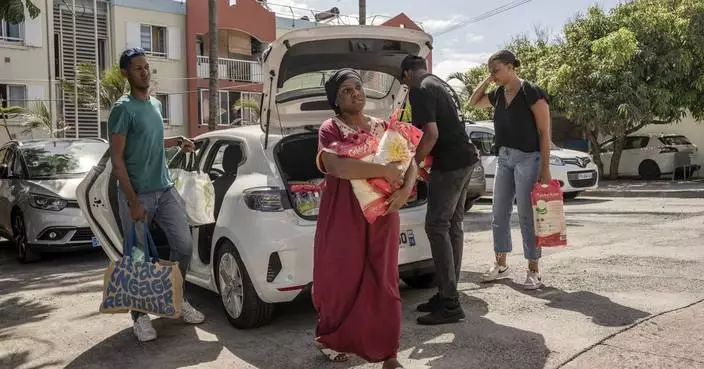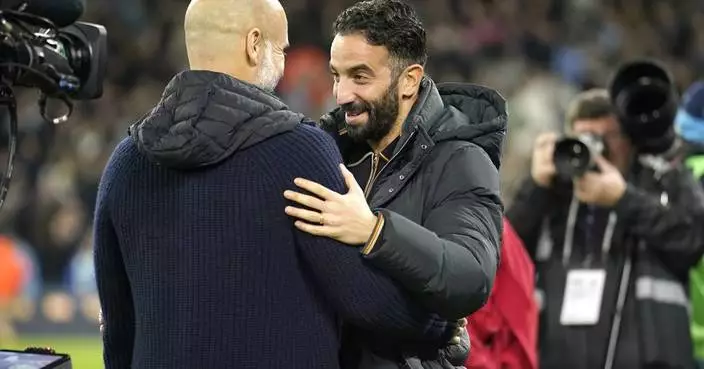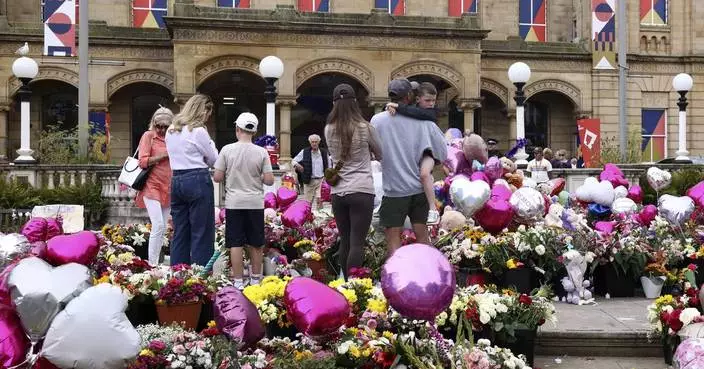The killing of a senior Russian general in a bombing outside his apartment building in Moscow was the boldest assassination yet of a top military officer and again brought the war in Ukraine to the streets of the capital.
Some things to know about the attack and who is suspected of being behind it:
Click to Gallery
Flowers are attached to the facade of an apartment block in Moscow, Russia, on Wednesday, Dec. 18, 2024, where a bomb killed Lt. Gen. Igor Kirillov, the head of Russia's Radiation, Biological, and Chemical Defense Forces, and his assistant, Ilya Polikarpov. (AP Photo/Dmitry Serebryakov)
FILE - Maj. Gen. Igor Kirillov, the chief of the Russian military's radiation, chemical and biological protection unit, attends a briefing in Kubinka Patriot park, outside Moscow, Russia, on June 22, 2018. (AP Photo, File)
Investigators work at the place where Lt. General Igor Kirillov, the head of Russia's Nuclear, Biological, and Chemical Defence Forces and his assistant, seen at lower center, were killed by an explosive device planted close to a residential apartment's block in Moscow, Russia, Tuesday, Dec. 17, 2024. (AP Photo)
A man lays flowers on Wednesday, Dec. 18, 2024, at the apartment block in Moscow, Russia, where a bomb killed Lt. Gen. Igor Kirillov, the head of Russia's Radiation, Biological and Chemical Defense Forces, and his assistant Ilya Polikarpov. (AP Photo/Dmitry Serebryakov)
A person walks past an apartment block in Moscow, Russia, Wednesday, Dec. 18, 2024, where a bomb killed Lt. Gen. Igor Kirillov, head of Russia's Radiation, Biological and Chemical Defense Forces and his assistant, Ilya Polikarpov. (AP Photo/Dmitry Serebryakov)
Flowers are attached to the facade of an apartment block in Moscow, Russia, on Wednesday, Dec. 18, 2024, where a bomb killed Lt. Gen. Igor Kirillov, the head of Russia's Radiation, Biological, and Chemical Defense Forces, and his assistant, Ilya Polikarpov. (AP Photo/Dmitry Serebryakov)
Lt. Gen. Igor Kirillov was killed Tuesday morning by a bomb hidden on an electric scooter parked near the entrance of his apartment block in southeastern Moscow as he left for his office. Kirillov’s assistant also died in the attack.
The bomb was triggered remotely, according to Russia’s Federal Security Service, or FSB. The explosion was caught on video from a camera mounted inside a car, showing the men walking out of the building and the fiery blast.
Kirillov, 54, was the chief of Russia's Radiation, Biological and Chemical Protection Forces. These special troops are tasked with protecting the military from the enemy’s use of nuclear, chemical or biological weapons and ensuring operations in a contaminated environment.
He was under sanctions from several countries, including the U.K. and Canada, for his actions in Moscow’s war in Ukraine. On Monday, Ukraine’s Security Service, or SBU, opened a criminal investigation against him, accusing Kirillov of directing the use of banned chemical weapons.
Russia has denied using any chemical weapons in Ukraine and has accused Kyiv of using them.
Kirillov, who took his post in 2017, was one of the highest profile figures to level those accusations. He held numerous briefings to accuse the Ukrainian military of using toxic agents and planning to launch attacks with radioactive substances — claims Kyiv and its Western allies rejected as propaganda.
His assistant, Ilya Polikarpov, was also killed in the attack.
An SBU official said Tuesday that the agency was behind the attack. The official, who spoke on condition of anonymity because they were not authorized to release the information, described Kirillov as a “war criminal and an entirely legitimate target.”
The SBU official provided the video of the bombing.
The FSB said Wednesday it detained a suspect, described as a citizen of the Central Asian nation of Uzbekistan who was born in 1995. The Tass and RIA-Novosti news agencies identified him as Akhmad Kurbanov.
According to the FSB, the suspect said he was recruited by Ukrainian special services. The Associated Press could not confirm the conditions under which the suspect made the statement to the security services.
The FSB said the suspect said he had been promised $100,000 and resettlement to a European Union country in exchange for killing Kirillov.
The agency said that acting on instructions from Ukraine, the suspect traveled to Moscow, where he obtained a homemade bomb, placed it on an e-scooter and parked it at the entrance to Kirillov's apartment building.
The suspect rented a car to monitor the location and set up a camera that livestreamed the scene to his handlers in the Ukrainian city of Dnipro, detonating the bomb when Kirillov left the building, the FSB said.
The suspect faces a sentence of up to life imprisonment, the FSB said.
Russian media reports said the FSB tracked the suspect by studying video from surveillance cameras and cellphone calls.
The FSB has not said how the suspect was recruited. He was detained in a village in the Moscow region, Interior Ministry official Irina Volk told Tass.
It is not known where he is being held or when he will appear in court. That is expected in the coming days, to hear the terms of his pre-trial detention. Under Russian law, a person may only be remanded in custody for 48 hours before a court order is made.
Russian officials have described the bombing as a “terrorist act.”
The Kremlin said Wednesday it was “obvious” that Ukraine was behind Kirillov’s killing, with spokesman Dmitry Peskov saying Kyiv “does not shy away from terrorist methods.”
While President Vladimir Putin has not publicly spoken about the attack, Peskov said he expressed his condolences on Kirillov's death.
Dmitry Medvedev, deputy head of Russia’s Security Council, described the attack as an attempt by Kyiv to distract public attention from its military failures and vowed that its “senior military-political leadership will face inevitable retribution.”
Vyacheslav Volodin, speaker of the lower house of parliament, called Kirillov “a professional military man, an intellectual, a Russian patriot.”
He “did a lot to increase the effectiveness of the radiation, chemical and biological defense forces, to ensure the security and sovereignty of our country,” Volodin said. —-
Illia Novikov in Kyiv, Ukraine, contributed.
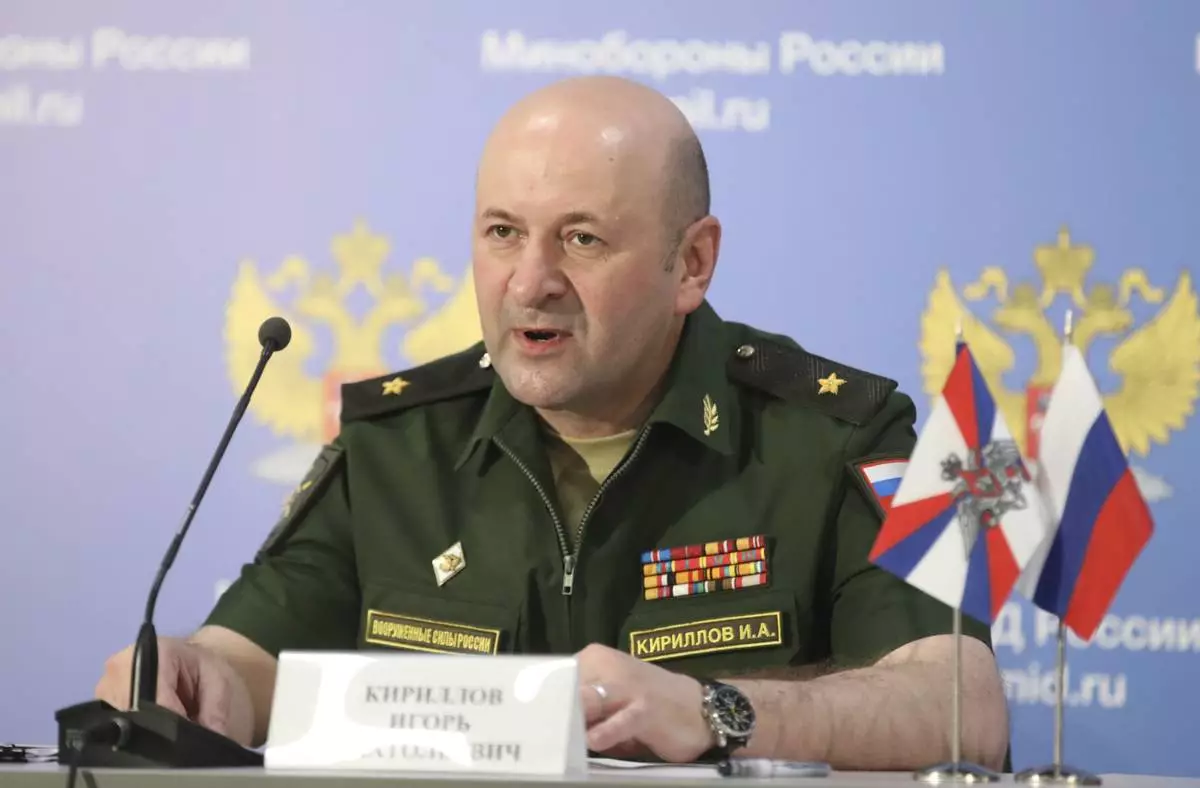
FILE - Maj. Gen. Igor Kirillov, the chief of the Russian military's radiation, chemical and biological protection unit, attends a briefing in Kubinka Patriot park, outside Moscow, Russia, on June 22, 2018. (AP Photo, File)
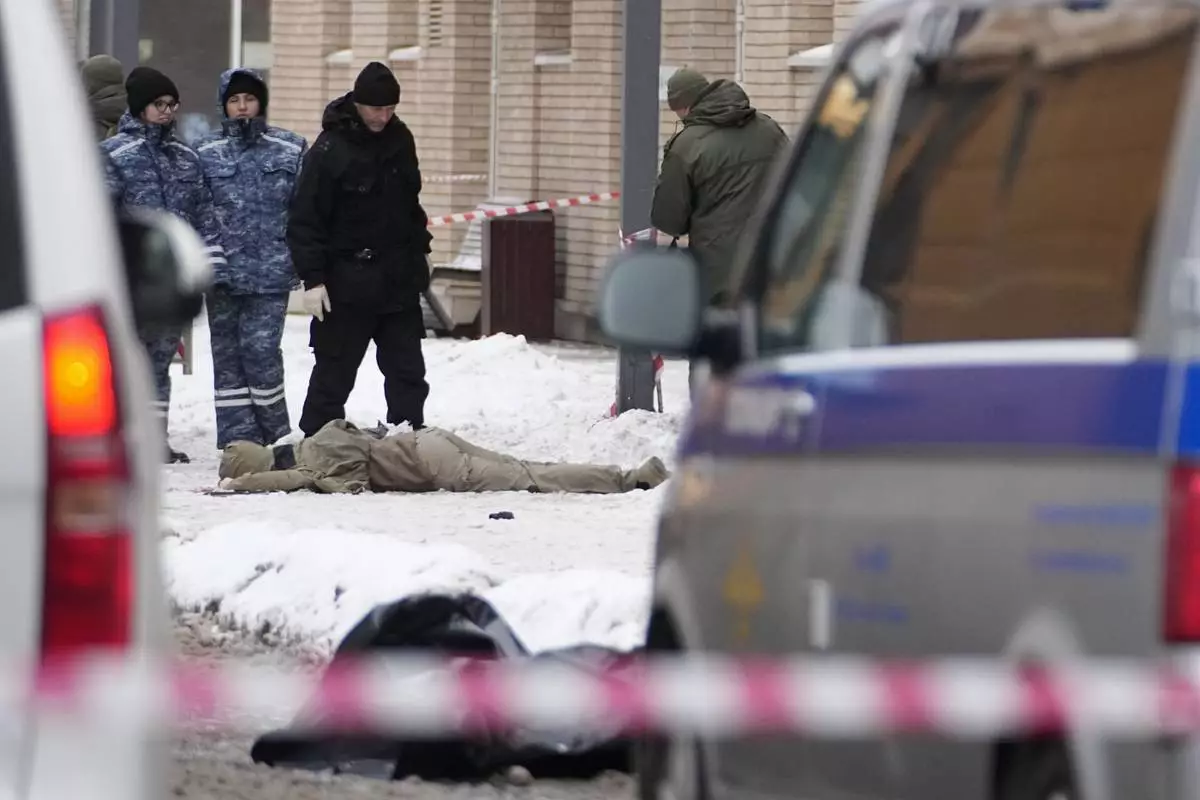
Investigators work at the place where Lt. General Igor Kirillov, the head of Russia's Nuclear, Biological, and Chemical Defence Forces and his assistant, seen at lower center, were killed by an explosive device planted close to a residential apartment's block in Moscow, Russia, Tuesday, Dec. 17, 2024. (AP Photo)
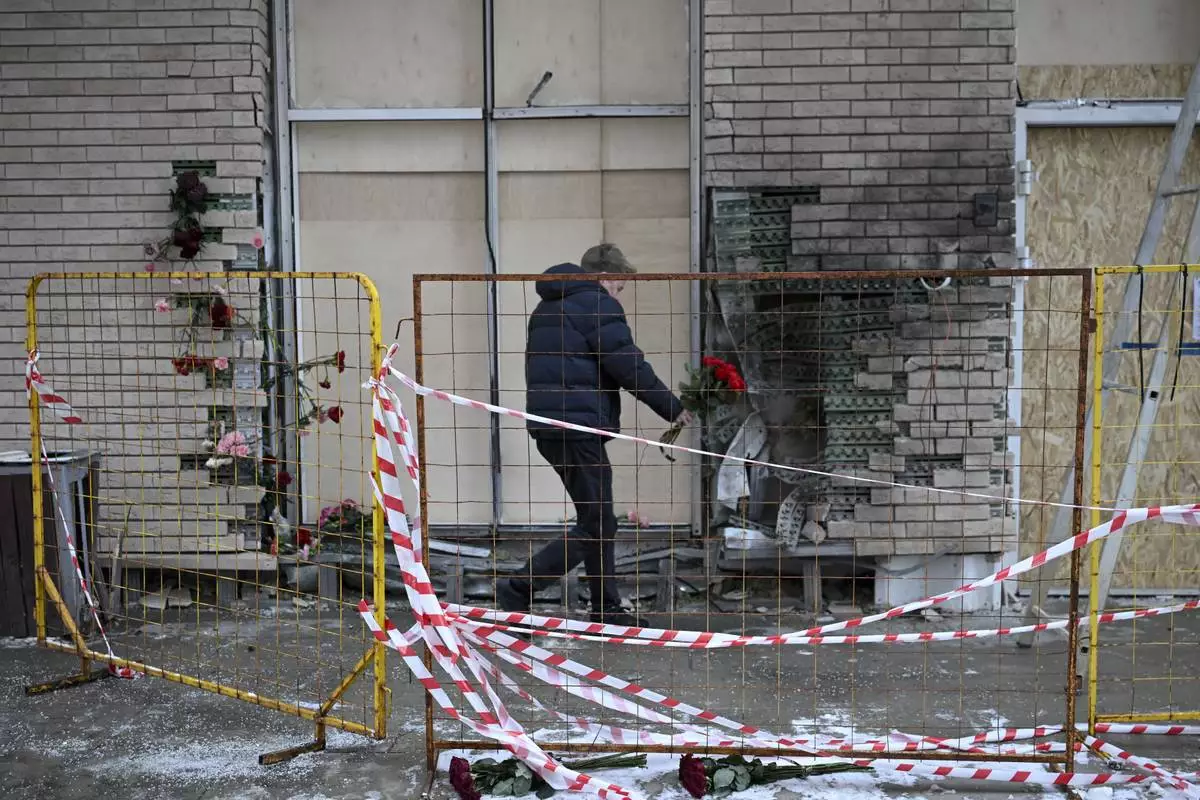
A man lays flowers on Wednesday, Dec. 18, 2024, at the apartment block in Moscow, Russia, where a bomb killed Lt. Gen. Igor Kirillov, the head of Russia's Radiation, Biological and Chemical Defense Forces, and his assistant Ilya Polikarpov. (AP Photo/Dmitry Serebryakov)
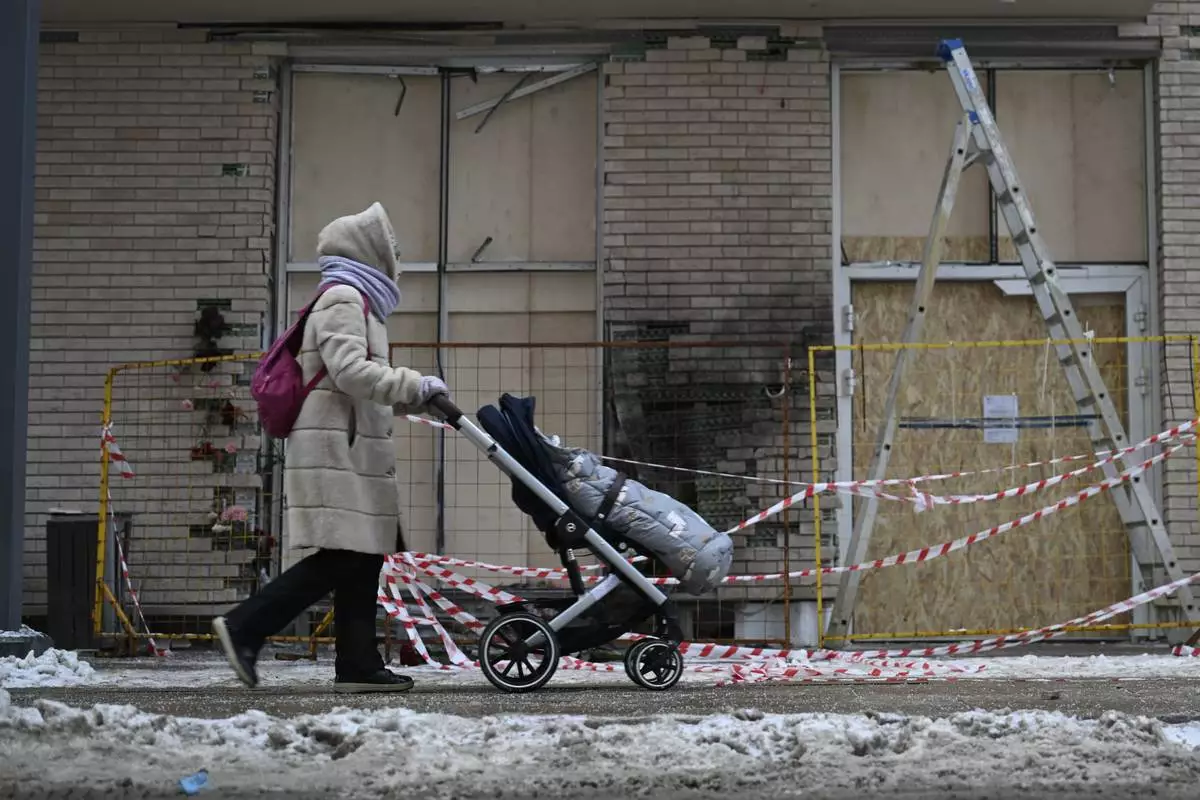
A person walks past an apartment block in Moscow, Russia, Wednesday, Dec. 18, 2024, where a bomb killed Lt. Gen. Igor Kirillov, head of Russia's Radiation, Biological and Chemical Defense Forces and his assistant, Ilya Polikarpov. (AP Photo/Dmitry Serebryakov)
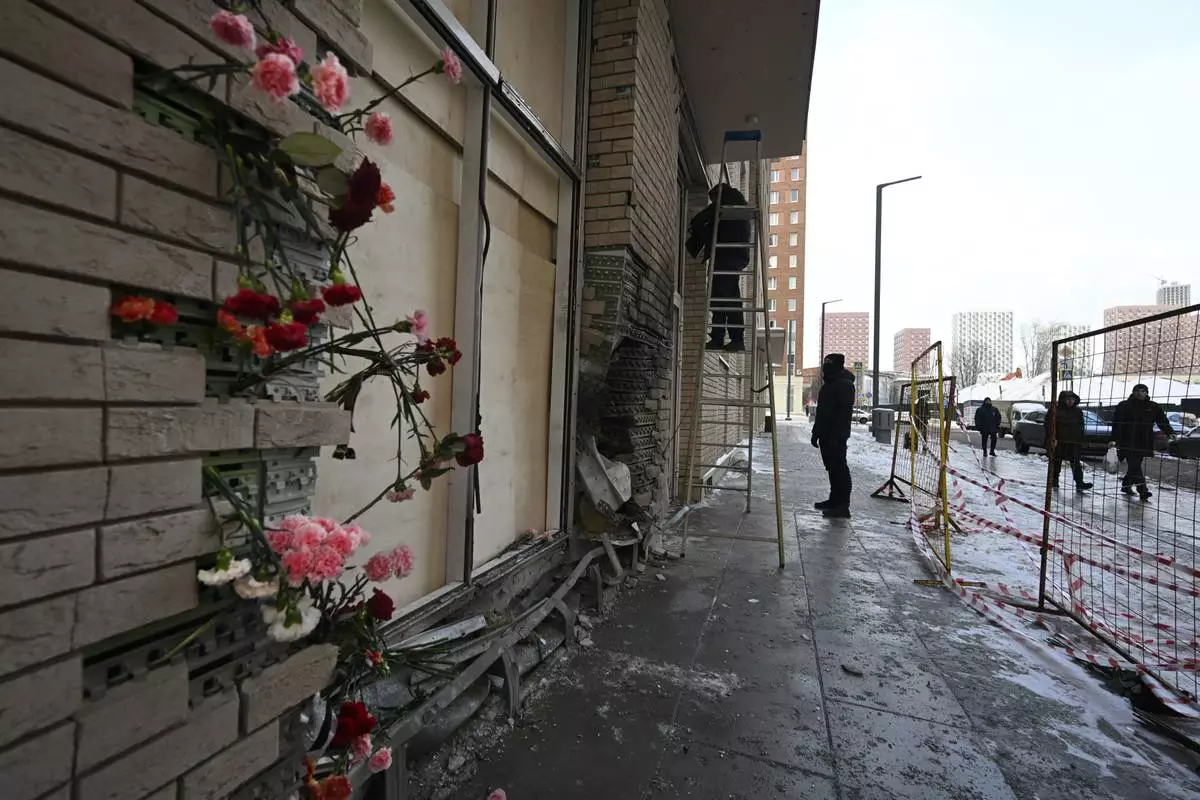
Flowers are attached to the facade of an apartment block in Moscow, Russia, on Wednesday, Dec. 18, 2024, where a bomb killed Lt. Gen. Igor Kirillov, the head of Russia's Radiation, Biological, and Chemical Defense Forces, and his assistant, Ilya Polikarpov. (AP Photo/Dmitry Serebryakov)
Russia's security service said Wednesday it detained a citizen from Uzbekistan in the bombing that killed a senior general as he left his southeastern Moscow apartment — a bold assassination that was claimed by Ukraine's security service.
Lt. Gen. Igor Kirillov was killed Tuesday by a bomb hidden on an electric scooter outside his apartment building, a day after Ukraine’s security service leveled criminal charges against him. His assistant, Ilya Polikarpov, also was killed.
The brazen bombing brought the nearly 3-year-old war in Ukraine once again to the streets of the capital.
The suspect was identified by Tass and RIA-Novosti news agencies as Akhmad Kurbanov of Uzbekistan.
The Federal Security Service, or FSB, which did not identify him, said he was born in 1995 and was recruited by Ukraine's security service The Associated Press could not confirm the conditions under which the suspect spoke to the FSB.
He said he had been promised $100,000 and resettlement in a European Union country in exchange for killing Kirillov, according to the FSB.
The agency said that acting on instructions from Ukraine, the suspect picked up a homemade bomb in Moscow, placed it on an e-scooter and parked it at the entrance to Kirillov's apartment building.
He rented a car to monitor the location and set up a camera that livestreamed the scene to his handlers in the Ukrainian city of Dnipro, the FSB said, detonating the bomb when Kirillov left the building.
The suspect, who was detained in a village in the Moscow region, according to Interior Ministry, could face a life sentence if convicted.
Kirillov, 54, was the chief of Russia’s Radiation, Biological and Chemical Protection Forces. These special troops are tasked with protecting the military from the enemy’s use of nuclear, chemical or biological weapons and ensuring operations in a contaminated environment.
He was under sanctions from several countries, including the U.K. and Canada, for his actions in Russia's full-scale invasion of Ukraine. On Monday, Ukraine’s Security Service, or SBU, opened a criminal investigation against him, accusing him of directing the use of banned chemical weapons.
Russia has denied using any chemical weapons in Ukraine and has accused Kyiv of using toxic agents in combat.
An SBU official told AP on Tuesday that the agency was behind the attack. The official, who spoke on condition of anonymity because they were not authorized to release the information, described Kirillov as a “war criminal and an entirely legitimate target.”
The SBU official provided video that was said to be of the bombing, showing two men leaving a building shortly before a blast fills the frame.
Kirillov, who took up his post in 2017, was one of the highest profile figures to level the accusations against Ukraine. He held numerous briefings to accuse the Ukrainian military of using toxic agents and planning to launch attacks with radioactive substances — allegations that Ukraine and its Western allies rejected as propaganda.
Russian officials described Kirillov's killing as an act of terrorism and vowed to punish Ukraine.
Kremlin spokesman Dmitry Peskov said Wednesday it was “obvious” that Ukraine was behind Kirillov's killing, saying Kyiv “does not shy away from terrorist methods.”
It was the second time this year that Russia has described an attack in Moscow as an act of terrorism and sought to tie it to Ukraine.
In March, when gunmen attacked a Moscow concert hall that killed more than 130 people, President Vladimir Putin said the assailants — four men from Tajikistan, also in Central Asia – were captured while fleeing to Ukraine. Russian officials have claimed that the suspects had links to Ukrainian intelligence agencies, although Kyiv firmly denied involvement and an affiliate of the Islamic State group claimed responsibility.
__
Illia Novikov in Kyiv, Ukraine, contributed.
Follow AP’s coverage of the war in Ukraine at https://apnews.com/hub/russia-ukraine
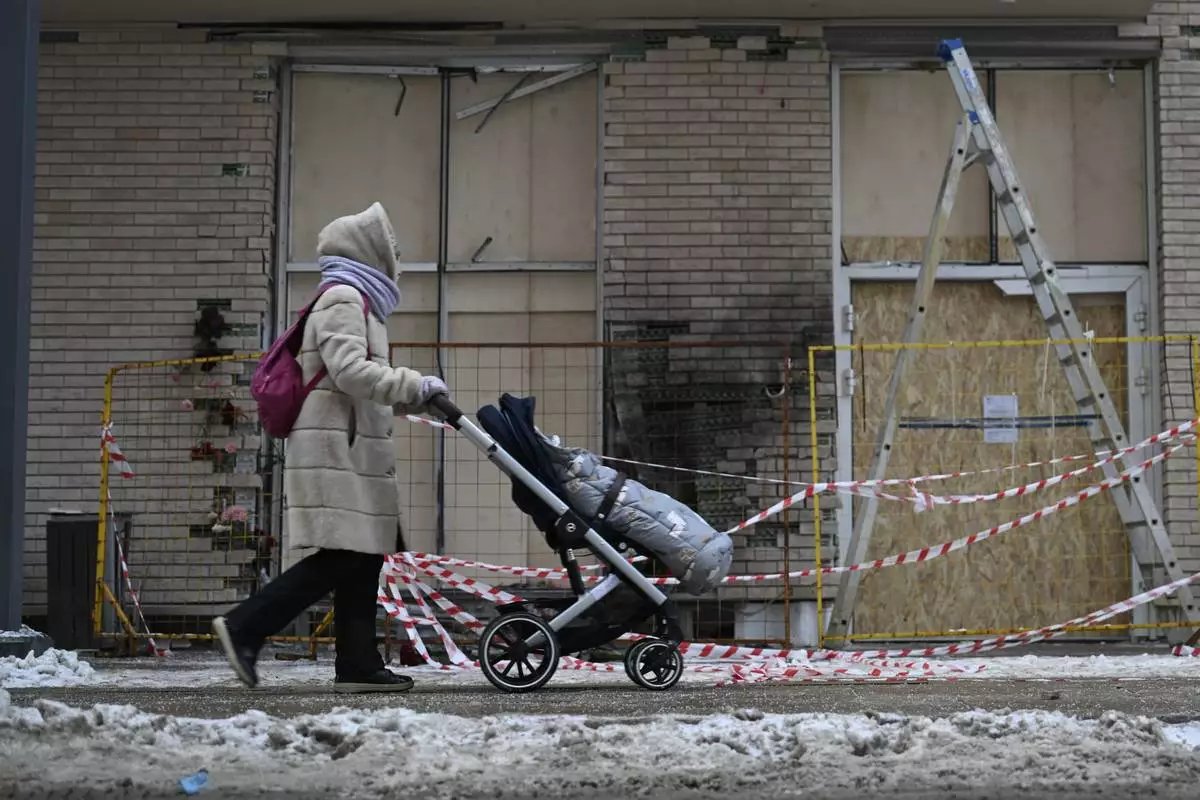
A person walks past an apartment block in Moscow, Russia, Wednesday, Dec. 18, 2024, where a bomb killed Lt. Gen. Igor Kirillov, head of Russia's Radiation, Biological and Chemical Defense Forces and his assistant, Ilya Polikarpov. (AP Photo/Dmitry Serebryakov)
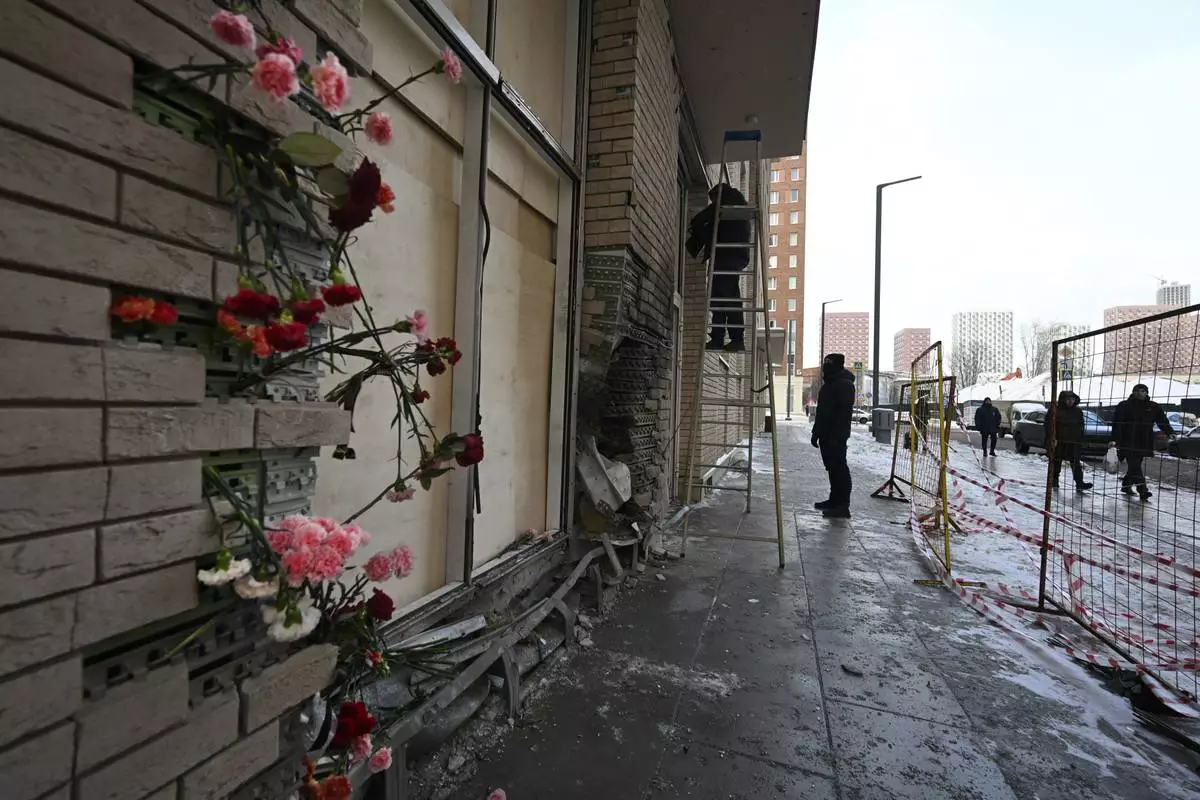
Flowers are attached to the facade of an apartment block in Moscow, Russia, on Wednesday, Dec. 18, 2024, where a bomb killed Lt. Gen. Igor Kirillov, the head of Russia's Radiation, Biological, and Chemical Defense Forces, and his assistant, Ilya Polikarpov. (AP Photo/Dmitry Serebryakov)
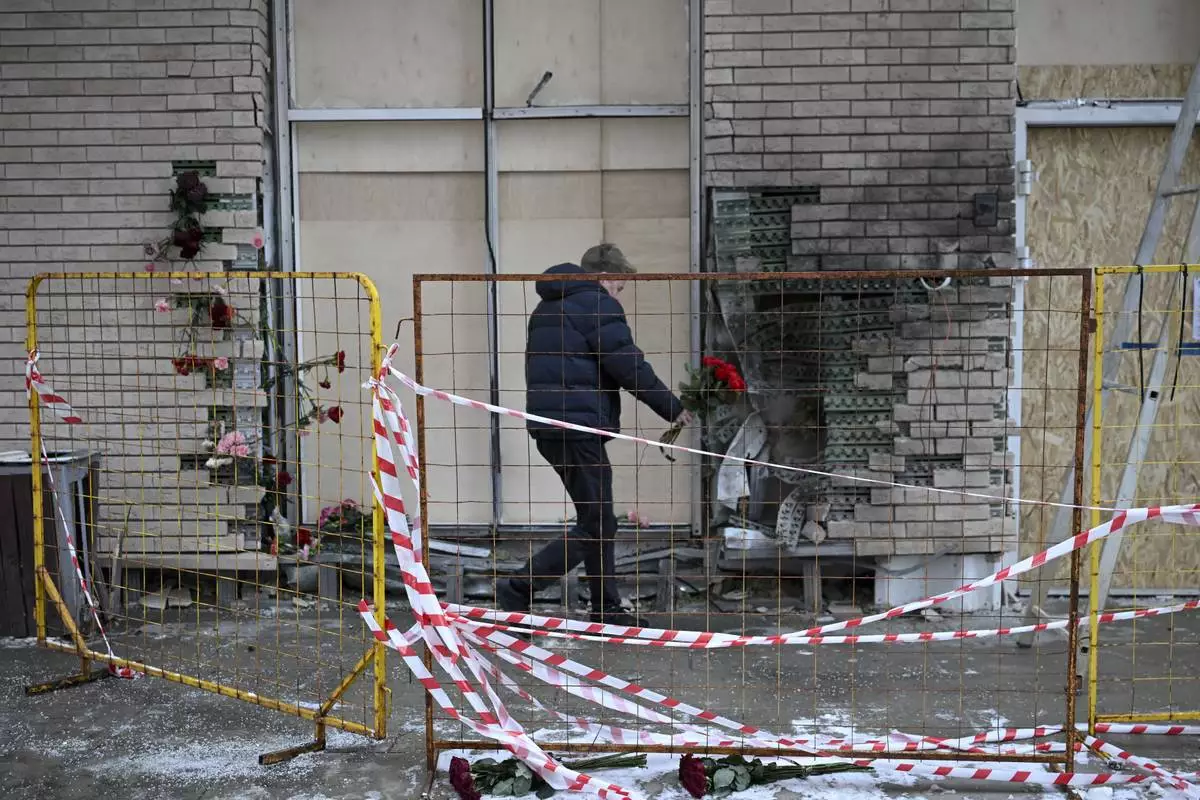
A man lays flowers on Wednesday, Dec. 18, 2024, at the apartment block in Moscow, Russia, where a bomb killed Lt. Gen. Igor Kirillov, the head of Russia's Radiation, Biological and Chemical Defense Forces, and his assistant Ilya Polikarpov. (AP Photo/Dmitry Serebryakov)
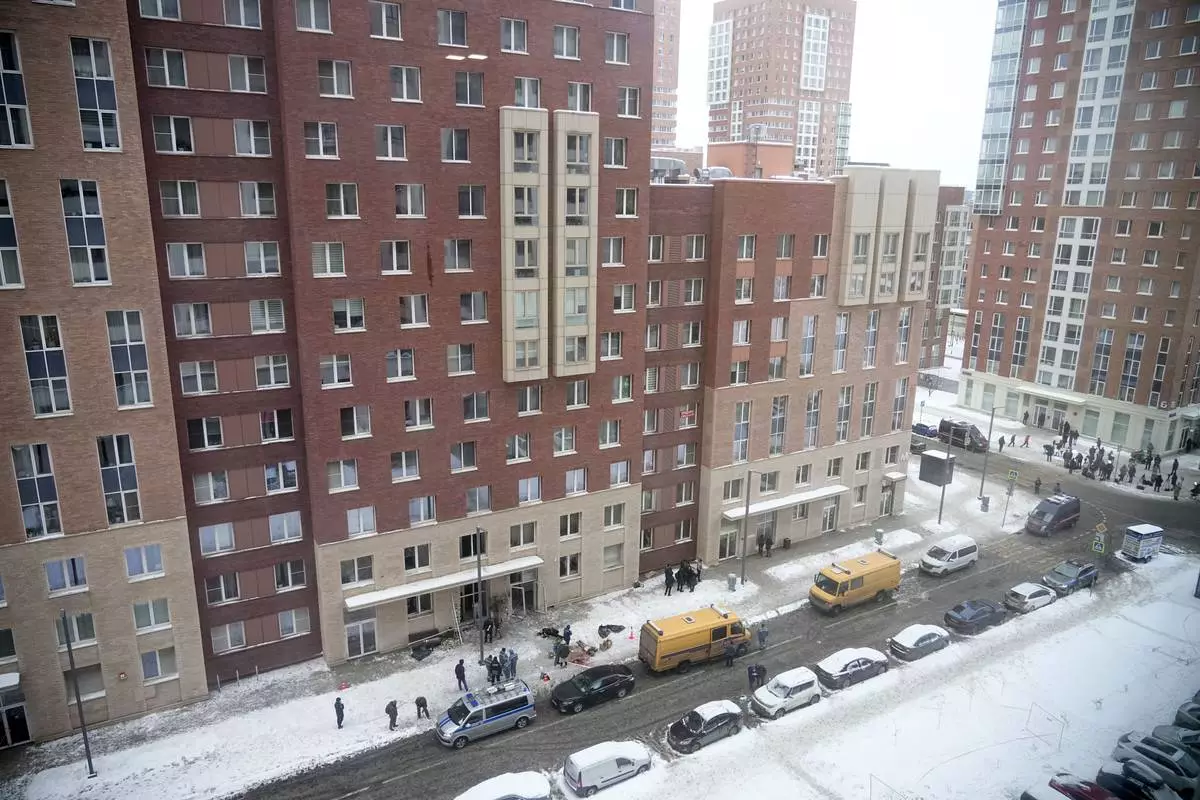
EDS NOTE: GRAPHIC CONTENT - Investigators work at the place where Lt. General Igor Kirillov, the head of Russia's Nuclear, Biological, and Chemical Defence Forces and his assistant Ilya Polikarpov were killed by an explosive device planted close to a residential apartment's block in Moscow, Russia, Tuesday, Dec. 17, 2024. (AP Photo)
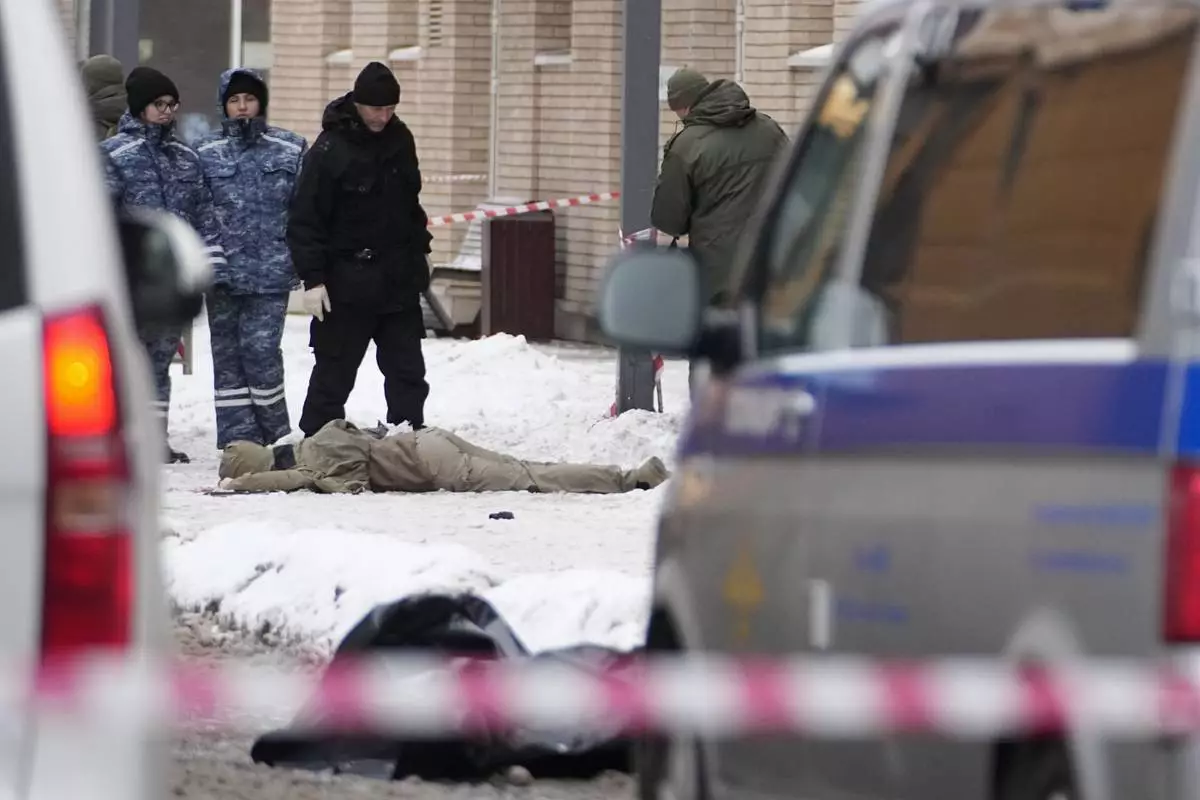
Investigators work at the place where Lt. General Igor Kirillov, the head of Russia's Nuclear, Biological, and Chemical Defence Forces and his assistant, seen at lower center, were killed by an explosive device planted close to a residential apartment's block in Moscow, Russia, Tuesday, Dec. 17, 2024. (AP Photo)
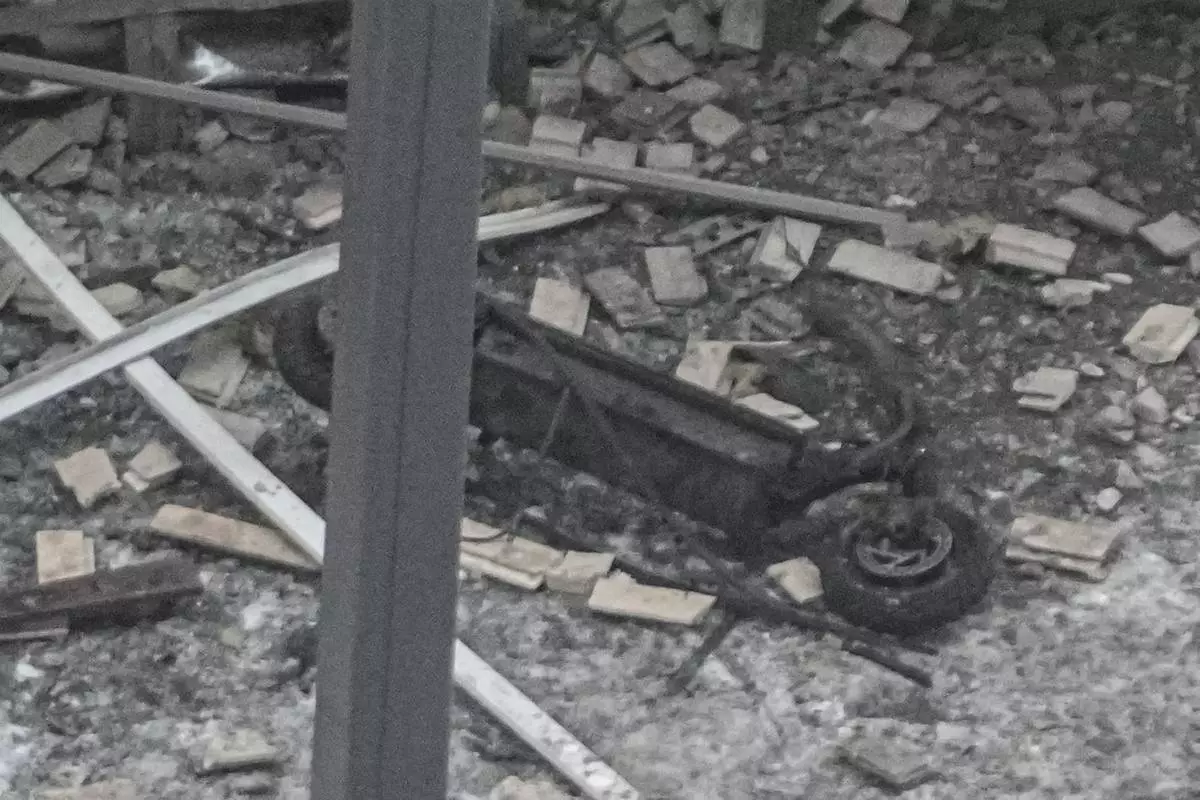
Investigators work near a scooter at the place where Lt. General Igor Kirillov, the head of Russia's Nuclear, Biological, and Chemical Defence Forces and his assistant Ilya Polikarpov were killed by an explosive device planted close to a residential apartment's block in Moscow, Russia, Tuesday, Dec. 17, 2024. (AP Photo)
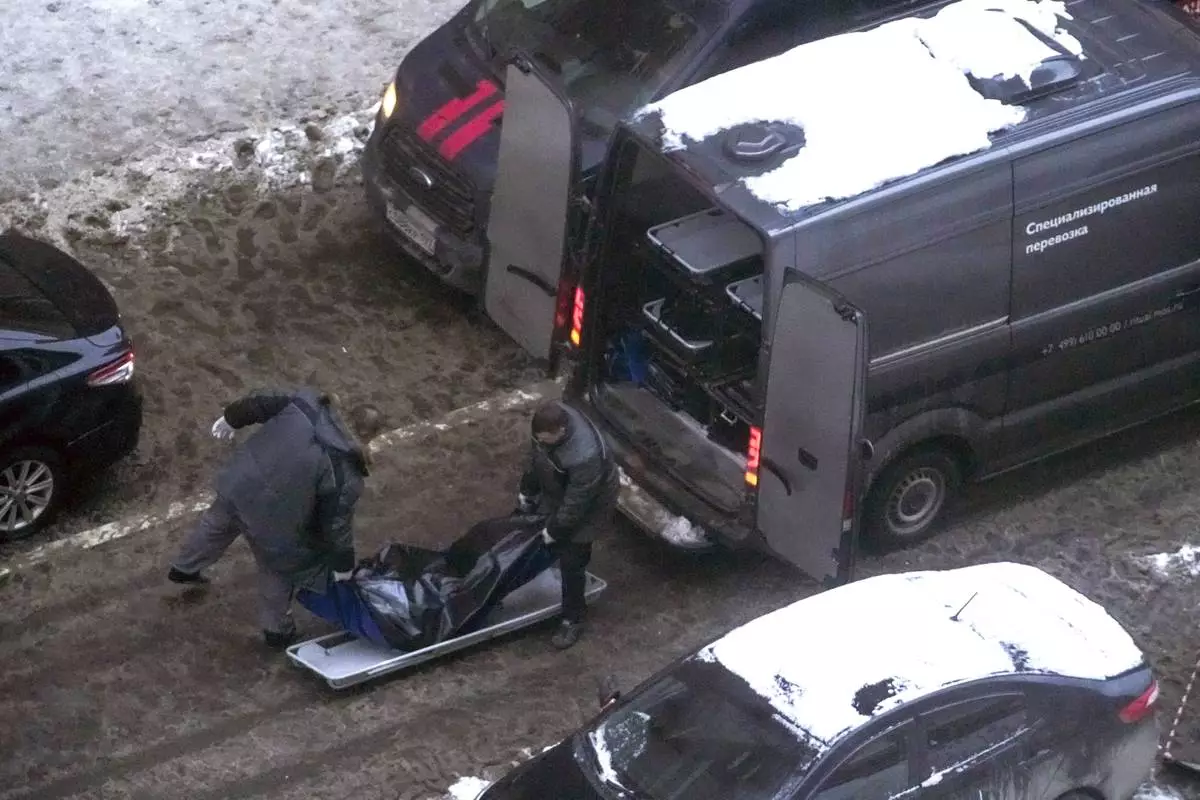
Workers load a body of Lt. General Igor Kirillov, the head of Russia's Nuclear, Biological, and Chemical Defence Forces into a bus after he and his assistant Ilya Polikarpov were killed by an explosive device planted close to a residential apartment's block in Moscow, Russia, Tuesday, Dec. 17, 2024. (AP Photo)
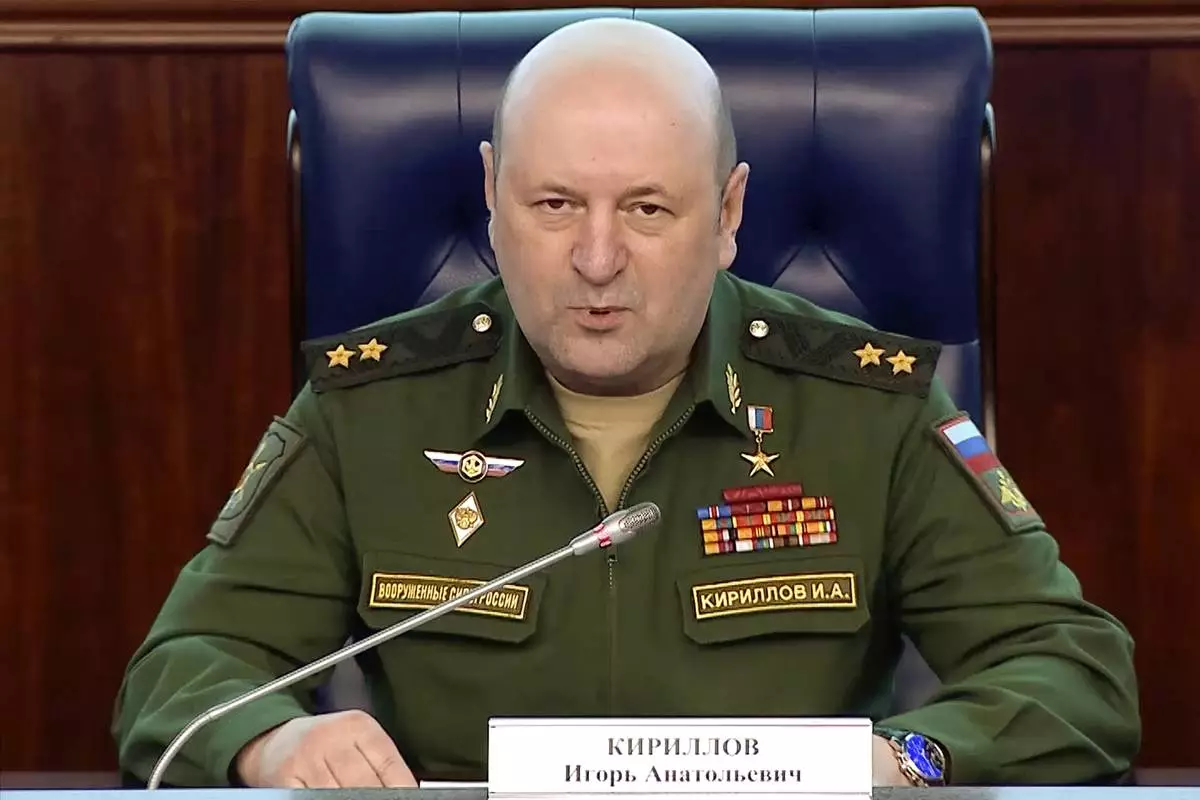
FILE - In this photo taken from video released by Russian Defense Ministry Press Service on Feb. 28, 2023, the head of the radiation, chemical and biological defense troops of the Russian Armed Forces Lt. Gen. Igor Kirillov speaks during a briefing in Moscow, Russia. (Russian Defense Ministry Press Service via AP, File)
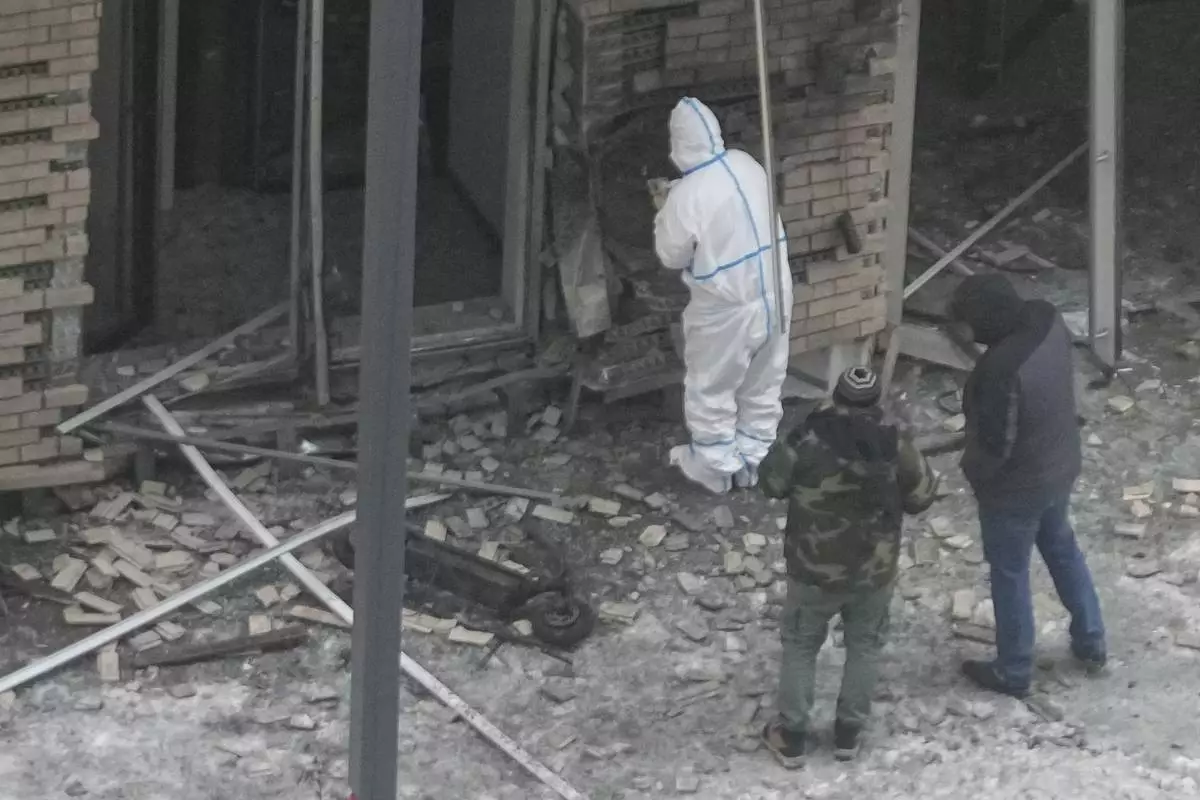
Investigators work near a scooter at the place where Lt. General Igor Kirillov, the head of Russia's Nuclear, Biological, and Chemical Defence Forces and his assistant Ilya Polikarpov were killed by an explosive device planted close to a residential apartment's block in Moscow, Russia, Tuesday, Dec. 17, 2024. (AP Photo)







